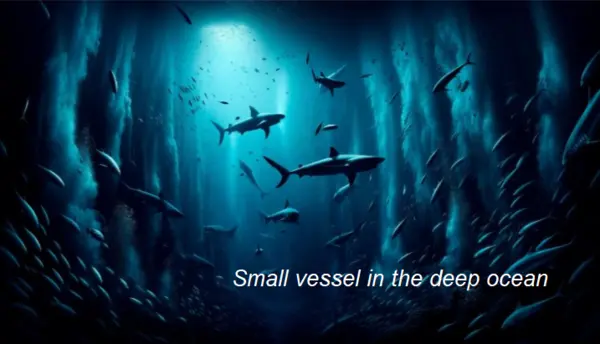The ocean covers more than 70% of our planet and remains one of the least explored frontiers on Earth. While massive research vessels have long been the go-to for deep-sea exploration, a new wave is emerging in marine science: small vessels. These nimble crafts are transforming how we explore the small vessel in the deep ocean, enabling researchers to access areas that were once deemed unreachable. Imagine gliding through underwater canyons or navigating coral reefs with ease—small vessels in the deep ocean are making this possible and igniting curiosity about what lies beneath those dark waters.
Let’s dive into how these innovative ships are reshaping marine exploration and uncovering secrets that could change our understanding of life in the depths.
The Role of small vessel in the deep ocean in Marine Exploration
Small vessel in the deep ocean play a crucial role in Marine Exploration. Their size allows for access to regions where larger ships cannot venture, like narrow straits or shallow coastal areas.
These nimble crafts can navigate tight spaces, making them ideal for detailed studies of unique ecosystems. Researchers can directly observe marine life and collect samples without disturbing the environment too much.
Moreover, small vessels are often more cost-effective than their larger counterparts. This affordability enables research teams with limited budgets to explore remote oceanic areas that were previously out of reach.
Equipped with advanced technology, these vessels can gather data on water temperature, salinity, and biodiversity. They act as mobile laboratories right at the heart of underwater discoveries.
Their agility fosters collaboration among scientists from different disciplines. As a result, interdisciplinary studies become easier and more efficient aboard a small vessel in the deep ocean.
Advancements in Technology for Small Vessels
Recent advancements in technology have transformed the capabilities of small vessels in the deep ocean. These innovations include cutting-edge sensors and imaging systems that can capture detailed underwater landscapes with unparalleled clarity.
Sonar technology has also seen significant improvements, allowing researchers to map seafloor structures accurately. This helps uncover previously hidden ecosystems and geological features.
Communication tools are another game-changer. Real-time data transmission allows scientists on land to receive live updates from small vessels, making collaboration seamless and efficient.
Moreover, autonomous vehicles equipped with advanced AI enhance exploration capabilities. They can navigate complex environments while collecting vital data without constant human intervention.
Battery life and energy efficiency have improved significantly too. Small vessels can now venture into deeper waters for longer durations, maximizing their research potential while minimizing environmental impact.
Benefits of Using small vessel in the deep ocean Exploration
small vessel in the deep ocean offer unparalleled access to remote marine environments. Their size allows for navigation into areas larger ships cannot reach.
These compact explorative crafts are often more cost-effective than their larger counterparts. They require less fuel and maintenance, making them sustainable options for long-term research efforts.
Flexibility is another advantage of small vessels. Researchers can quickly adapt these boats for specific missions, whether it’s collecting samples or conducting surveys.
Moreover, smaller teams can operate these vessels, promoting collaboration among scientists from various fields. This synergy often leads to innovative approaches and fresh perspectives on marine studies.
Small vessels foster a strong connection between researchers and the environment they study. Being close to the water helps scientists observe behaviors and phenomena that might be missed from a distance aboard larger ships.
Case Studies: Successful Discoveries Made by Small Vessels
Small vessels have played a pivotal role in uncovering the mysteries of our oceans. One notable example is the exploration of hydrothermal vents in the Pacific Ocean. Using small remotely operated vehicles (ROVs), researchers discovered thriving ecosystems around these vents that rely solely on chemosynthesis, revolutionizing our understanding of life in extreme conditions.
Another remarkable case involved a small research catamaran that ventured into uncharted waters near Antarctica. It captured stunning footage and samples of previously unknown marine species, contributing significantly to biodiversity data.
A recent expedition focused on underwater cave systems also yielded treasure troves of archaeological artifacts linked to ancient civilizations. These findings not only shed light on human history but also emphasized the importance of protecting fragile marine environments.
Such discoveries highlight how agile and equipped small vessels can navigate challenging terrains, driving innovation within marine science and conservation efforts.
Future Possibilities and Potential for Small Vessels in Marine Exploration
The future of marine exploration with small vessel in the deep ocean looks incredibly promising. As technology continues to evolve, these nimble crafts will become even more efficient and versatile.
Imagine autonomous small vessels equipped with advanced sensors and AI capabilities. They could explore areas that are currently too dangerous or difficult for larger ships.
Collaboration between scientists and engineers is paving the way for innovative designs tailored specifically for small vessel in the deep ocean research. These new vessels might incorporate renewable energy sources, reducing their environmental impact while maximizing operational time.
Moreover, as citizen science gains momentum, smaller crafts can facilitate public involvement in ocean exploration. This democratization of science can lead to a broader understanding and appreciation of our oceans.
With ongoing investments in marine technology, we stand on the brink of discovering uncharted territories beneath the waves. The potential for groundbreaking discoveries is limitless when it comes to small vessels in the deep ocean.
Conclusion: Small vessel in the deep ocean
The impact of small vessel in the deep ocean is profound and far-reaching. As we continue to unlock the mysteries of our oceans, these nimble crafts play a crucial role in marine exploration. Their flexibility allows researchers to access areas that larger ships simply cannot reach.
These smaller vessels foster collaboration among scientists, educators, and enthusiasts alike. They make it possible for diverse teams to intimately engage with the ocean environment. This accessibility encourages innovation and creativity in research methodologies.
Small vessels are becoming even more efficient with technological advancements, such as improved sensors and communication tools.
